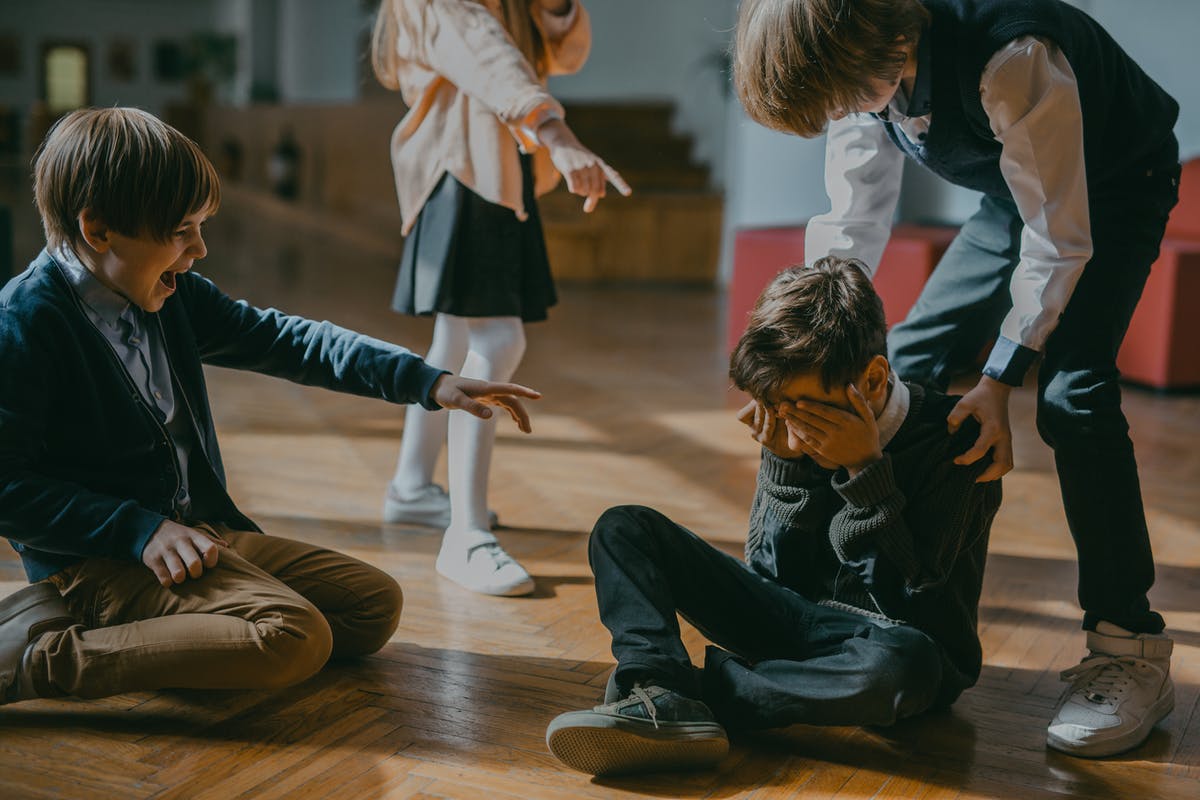Parenting Conversation: Bullying
6th September 2022
You are such a loser!
Concrete playgrounds are filled with complex cliché groups and their politics: the jocks, the nerds, the swim team, and gossip girls. The list goes on and on. And while being in different social groupings is mostly fine, there are lines of aggression that should just never be crossed. The National Center for Education Statistics and Bureau of Justice found that 22%of 12 to 18-year-olds experience bullying. So it’s a conversation that is utterly and unfortunately necessary.
In 2020, a man wrote to a bully from his schoolyard days to ask why he was targeted. He expressed how deeply this dynamic affected him and his self-worth over a lifetime. He didn’t expect a response, but a response is what he got. He received a thorough and heartfelt apology, in which his bully explained that his deep-rooted insecurities compelled him to push others down to elevate himself, which is so often the case. He went on to articulate that it’s all he knew to do since it’s what he saw at home–a sad indictment of what some go through as children, both those who are bullied and those who bully. It was an apology that went a long way to release some of the pain he’d endured for many years. Not that this excuses the behavior, of course, but what’s clear and within our range of vision is that bullying is complicated and often misunderstood. Let’s clear it up, what exactly is the definition:
Bullying is unwelcome, aggressive behavior that involves a real or perceived power imbalance. The actions are repeated or have the potential to be repeated.

Even the idea of our children being on the receiving end of abuse is devastating. As we learn of different variations of this systematic conduct, we realize it's a pandemic that needs to be addressed urgently. Andtogether. What is conjured in the mind when we contemplate bullying is usually the old-school, unholy trinity: verbal, social, and physical. These assaults increase the likelihood of depression/anxiety, health issues, decreased academic achievement, and the tragic outcome of violent retaliation. School shootings have become all too common in the United States, a gut-wrenching action frequently involving children on the receiving end of bullying. Devastating, unfathomable aftermath. Some of us as parents may not fully grasp that taunting has become increasingly sophisticated with the advent of the all-pervasive technological age of social media. Kids no longer have a reprieve from the onslaught but arrive home to an afternoon snack and a morsel of cyber castigation. Cyberbullying can involve online harassment, hate messages, threats, impersonation, and private or public humiliation. Some parents choose an open social media policy to monitor their children’s online activity, which ensures detrimental communication is curbed efficiently. Other strategies may include keeping the computer in a communal space like the kitchen and implementing time parameters for social media use. But keeping an eye on our kids isn’t always possible, and certainly impossible as they enter their later schooling years. Showing up as parents sometimes means we articulate that we are there for them, even if we can’t always be there.
Our friend’s bullying story above glaringly highlights that the fallout can endure through adulthood, affecting emotional, social, and career outcomes. But it’s also a real-life example demonstrating the phenomenal power of discourse and communication. So let’s get practical.

SCENE ONE, TAKE ONE:
Your child is being bullied, of that much you’re sure. You can tell by how they’ve become withdrawn, sullen, pick at their lasagna like a sparrow, and come home with unexplained bruising. Sometimes there are torn clothes, missing personal belongings, and constant reasons why they cannot attend school. At night there are bad dreams, complaints of headaches, and they seem teary, panicked, or afraid. Grades have plummeted in two of their classes, and a once happy, outgoing child now keeps to themselves.
So you give them some approaches to consider. Could they laugh or tell them to stop? Could they position themselves near an adult to deter the bully or confide in a teacher? Consider rearranging where your child sits in class, eats lunch, and travels to and from school. Additionally,you can write down everything, approach the school immediately, confidentially if that can help, and monitor and care for your child.
Talking about bullying should start before entering school, teaching children that they should never be made to feel uncomfortable by someone else, be it through schoolyard teasing, pushing, racist/physical comments, or online harassment. Knowing how to identify these situations before they arise ensures earlier action. It’s not always easy to ask if your child is being bullied or if they are witnessing bullying, so sometimes casual questions can open the dialogue and create a safe space for them to feel they can talk to you:
- I watched some news on bullying yesterday. Is that something that happens at your school to anyone?
- You seem a little different lately. Is there anyone picking on you at school or leaving you out?
- What would you say to someone in class if you saw them being bullied or bullying someone else?
Working together early as a community can stop and even prevent the behavior!

SCENE TWO, TAKE ONE:
You can’t believe it; YOUR child is the bully. It seems surreal, and you want to deny it’s even happening. But it is. And the only way to stop it is to address it straight away. Sit down and explain how these actions hurt others and help them empathize with the other person; give examples or watch films of real-life stories to illustrate. Implement meaningful consequences and follow through on them, providing boundaries and a framework that curbs the behavior and fast. Shaming your child isn’t helpful; we need to stay connected to them, so they don’t feel we’re the enemy and make the situation worse. And besides, there’s a reason they’re bullying others, and we need open dialogue to find the root cause. There are tons of reasons: they themselves are being bullied, boredom, or perhaps they’re concerned with their image and reputation, wanting to look ‘cool’ to their peers by starting rumors or humiliating others. The list is endless.
But one rumor is true:
Bullying can be stopped if we work together and have these tough conversations.
So, what are your options if the parent of a bully isn’t cooperative when you approach them and is unwilling to acknowledge the situation? This is when we need to get the school, its policies, and strategies involved. There are procedures for interventions and, most importantly, consequences for bullies even if their parents are recalcitrant. Suspension and expulsion guidelines are there for a reason, and these guidelines are usually enough to ensure everyone adjusts their behavior. There can be no tolerance for bullying.
MORE INFORMATION:
Have a question for MC?
Email us at askmc@mariechantal.com

Join Us On Spotify
Browse MC's recommended playlists for bathtime, playtime and then when baby has gone to bed, grown-up time.



